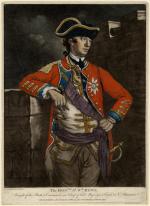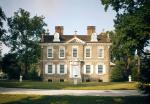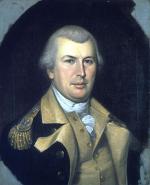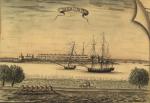Chapter Three: Occupation of Philadelphia
Eighteenth century warfare had the potential for brutality as well as surprising civility. The Revolutionary War in particular offered opportunities for both extremes, because it was a conflict among people who sometimes knew each other well.
Two days after George Washington had launched a bold, bloody (and failed) assault on the British forces occupying Philadelphia, he dictated a thoughtful note to his adversary, General Sir William Howe. It seemed that in the chaos of the battle, the British commander had lost his dog. Washington's message, delivered on October 6, 1777, and written by his aide, Alexander Hamilton, read:
Sir William Howe. It seemed that in the chaos of the battle, the British commander had lost his dog. Washington's message, delivered on October 6, 1777, and written by his aide, Alexander Hamilton, read:
Howe had himself set the gentlemanly pace of the relationship between the two commanders a few weeks earlier when he invited Washington to send a delegation of physicians to recover the American wounded who had been left behind following the Battle of Brandywine. Dr. Benjamin Rush, who led the delegation, reported bluntly that the wounded received better treatment from the British than they would have received if they had been left under the care of Americans.
Dr. Benjamin Rush, who led the delegation, reported bluntly that the wounded received better treatment from the British than they would have received if they had been left under the care of Americans.
The aftermath of Brandywine, however, was not completely civilized. About a week after the encounter, British troops led by Charles "No Flint" Grey surprised a contingent of Americans under the command of Anthony Wayne at Paoli on September 21. Wayne, who was a native of the area, had convinced General Washington that he could disrupt the British supply lines with irregular, guerrilla style attacks. Instead, the British commander ordered his men to attack the American camp at midnight with only bayonets fixed ("no flint" for their muskets) and, under cover of night, slaughter their enemies. The result was the "Paoli Massacre," in which fifty-three Continental soldiers were killed and 100 wounded. This wartime atrocity became a rallying cry for retribution by the Continental Army. It wasn't Wayne's last stand, however. He survived both the attack and his subsequent court-martial.
Anthony Wayne at Paoli on September 21. Wayne, who was a native of the area, had convinced General Washington that he could disrupt the British supply lines with irregular, guerrilla style attacks. Instead, the British commander ordered his men to attack the American camp at midnight with only bayonets fixed ("no flint" for their muskets) and, under cover of night, slaughter their enemies. The result was the "Paoli Massacre," in which fifty-three Continental soldiers were killed and 100 wounded. This wartime atrocity became a rallying cry for retribution by the Continental Army. It wasn't Wayne's last stand, however. He survived both the attack and his subsequent court-martial.
 The Battle of Germantown, October 4, 1777, was intended as revenge, not only for the Continental Army's defeat at Brandywine and Paoli, but also for the subsequent occupation of Philadelphia by the British. Washington convinced his generals to back an ambitious plan to attack British positions in Germantown, on the outskirts of the city, in four separate columns that would proceed, as Grey's forces, in complete silence during the middle of the night.
The Battle of Germantown, October 4, 1777, was intended as revenge, not only for the Continental Army's defeat at Brandywine and Paoli, but also for the subsequent occupation of Philadelphia by the British. Washington convinced his generals to back an ambitious plan to attack British positions in Germantown, on the outskirts of the city, in four separate columns that would proceed, as Grey's forces, in complete silence during the middle of the night.
What resulted was a small disaster of confusion, mistaken identities, poor battlefield decisions, and missed opportunities for the Continental Army. Some of the American regiments got lost, others distracted, and some got so turned around they ended up shooting at other Americans. The key to the battle was a pocket of British resistance at a residence along the main road through Germantown. Cliveden, or the Chew Mansion (named after its owner, Pennsylvania jurist Benjamin Chew) provided cover for a brave contingent of royal soldiers who simply refused to surrender. Rather than continuing their assault, the Americans wasted valuable time trying to dislodge the stubborn 40th Regiment led by Lieutenant Colonel Thomas Musgrave.
The bitterness that began to explode in the aftermath of the Germantown defeat was contained only by the good news from Saratoga, New York. Two weeks after Washington's forces lost their assault on Philadelphia, Continental General Horatio Gates secured the surrender of British General John Burgoyne's 9,000 troops in Saratoga.
The two events were not unrelated – Washington's continued activity kept Howe locked down in Pennsylvania – but many Americans now openly questioned the quality of their military leadership. Dr. Rush, for one, viewed Washington's principal subordinates during the Philadelphia campaign with scorn. He called General Nathanael Greene "a sycophant" to the commander-in-chief, dismissing him as "timid, speculative, [and] without enterprise." He labeled General John Sullivan of New Hampshire, "weak vain, without dignity, fond of scribbling," and "in the field a madman." General William Alexander, known as Lord Stirling, he considered "proud, vain, lazy," and an "ignorant drunkard." At the bottom of the list was General Adam Stephen, soon court-martialed for alleged drunkenness, whom the doctor ridiculed as a "sordid, boasting cowardly sot."
Complaints about Washington grew louder as well. An informal movement to replace him as commander-in-chief with Horatio Gates steadily gained adherents. The fall of Fort Mifflin to the British in mid-November did little to help Washington's standing. Even though the defenders of the American outpost bravely withstood British bombardment for weeks, the surrender of the fort meant that Howe had now perhaps gained permanent control of Philadelphia.
Fort Mifflin to the British in mid-November did little to help Washington's standing. Even though the defenders of the American outpost bravely withstood British bombardment for weeks, the surrender of the fort meant that Howe had now perhaps gained permanent control of Philadelphia.
The British forces found life in the city quite hospitable, living easily among the well-heeled Tory merchants. By comparison, the American forces, lingering as they were on the outskirts of Philadelphia, suffered greatly during the winter of 1777-78. From their sacrifices, however, came a new sense of discipline and urgency that helped focus the Revolutionaries on ultimate victory.
Two days after George Washington had launched a bold, bloody (and failed) assault on the British forces occupying Philadelphia, he dictated a thoughtful note to his adversary, General
"General Washington's compliments to General Howe. He does himself the pleasure to return him a dog, which accidentally fell into his hands, and by the inscription on the Collar appears to belong to General Howe."
Howe had himself set the gentlemanly pace of the relationship between the two commanders a few weeks earlier when he invited Washington to send a delegation of physicians to recover the American wounded who had been left behind following the Battle of Brandywine.
The aftermath of Brandywine, however, was not completely civilized. About a week after the encounter, British troops led by Charles "No Flint" Grey surprised a contingent of Americans under the command of
What resulted was a small disaster of confusion, mistaken identities, poor battlefield decisions, and missed opportunities for the Continental Army. Some of the American regiments got lost, others distracted, and some got so turned around they ended up shooting at other Americans. The key to the battle was a pocket of British resistance at a residence along the main road through Germantown. Cliveden, or the Chew Mansion (named after its owner, Pennsylvania jurist Benjamin Chew) provided cover for a brave contingent of royal soldiers who simply refused to surrender. Rather than continuing their assault, the Americans wasted valuable time trying to dislodge the stubborn 40th Regiment led by Lieutenant Colonel Thomas Musgrave.
The bitterness that began to explode in the aftermath of the Germantown defeat was contained only by the good news from Saratoga, New York. Two weeks after Washington's forces lost their assault on Philadelphia, Continental General Horatio Gates secured the surrender of British General John Burgoyne's 9,000 troops in Saratoga.
The two events were not unrelated – Washington's continued activity kept Howe locked down in Pennsylvania – but many Americans now openly questioned the quality of their military leadership. Dr. Rush, for one, viewed Washington's principal subordinates during the Philadelphia campaign with scorn. He called General Nathanael Greene "a sycophant" to the commander-in-chief, dismissing him as "timid, speculative, [and] without enterprise." He labeled General John Sullivan of New Hampshire, "weak vain, without dignity, fond of scribbling," and "in the field a madman." General William Alexander, known as Lord Stirling, he considered "proud, vain, lazy," and an "ignorant drunkard." At the bottom of the list was General Adam Stephen, soon court-martialed for alleged drunkenness, whom the doctor ridiculed as a "sordid, boasting cowardly sot."
Complaints about Washington grew louder as well. An informal movement to replace him as commander-in-chief with Horatio Gates steadily gained adherents. The fall of
The British forces found life in the city quite hospitable, living easily among the well-heeled Tory merchants. By comparison, the American forces, lingering as they were on the outskirts of Philadelphia, suffered greatly during the winter of 1777-78. From their sacrifices, however, came a new sense of discipline and urgency that helped focus the Revolutionaries on ultimate victory.














